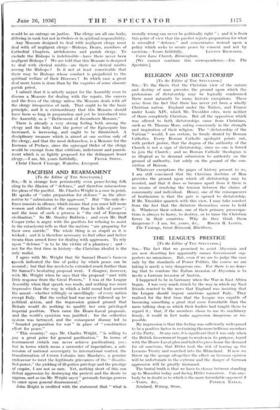RELIGION AND DICTATORSHIP
[To the Editor of THE SPECTATOR.] Sra—To the thesis that the Christian view of the nature and destiny of man provides the ground upon which the pretensions of dictatorship may be logically condemned there must naturally be many historic exceptions. These arise from the fact that there has never yet been a wholly Christian nation. England under the Tudors, and France under Louis XIV, which Mr. Tresidder cites, were neither of them completely Christian. But all the opposition which was offered to both dictatorships came from Christians, such as St. Thomas More, acting consciously in the strength and inspiration of their religion. The " dictatorship of the Vatican " would, I am certain, be firmly denied by Roman Catholics. Every Roman Catholic apologist points out, with perfect justice, that the dogma of the authority of the Church is not a sign of dictatorship, since no one is forced to join the Church ; and no Roman Catholic theologian is so illogical as to demand submission to authority on the ground of authority, but solely on the ground of the con- viction of Reason.
Whatever exceptions the pages of history present to us, I am still convinced that the Christian doctrine of Man provides the ground upon which all dictatorship may be resisted, and that it does so because apart from it there is no means of resolving the tension between the chums of community and individual. Hence, one of the consequences of heathenism is that the gate is opened to dictatorship. If Mr. Tresidder quarrels with this view, I may take comfort from the fact that the dictators themselves seem to hold it. Whatever their colour, one of their primary preoccupa- tions is always to harry, to destroy, or to tame the Christian forces in their countries. Why do they think them










































 Previous page
Previous page